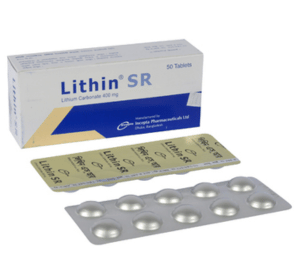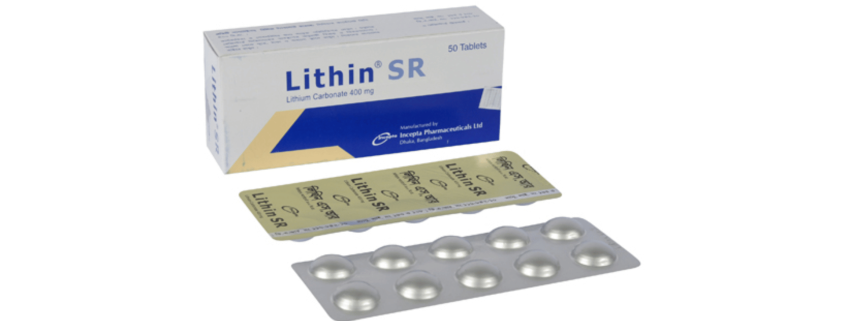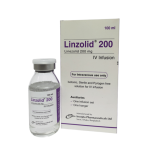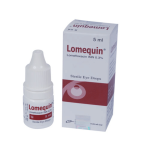Lithin SR(Lithium Carbonate )

Therapeutic Group: Drugs of Nervous System
Presentation
Lithin SR Tablet: Each Sustained Release tablet contains Lithium Carbonate BP 400 mg.
Description
Preclinical studies have shown that lithium alters sodium transport in nerve and muscle cells and effects a shift toward intraneuronal metabolism of catecholamines, but the specific biochemical mechanism of lithium action in mania is unknown.
Indications
Treatment and prophylaxis of mania, bipolar disorder and recurrent depression.
Dosage & Administration
Adult and child over 12 years, treatment, initially 1-1.5 g daily; prophylaxis, initially 300-400 mg daily.
Side Effects
Tiredness, loss of appetite, nausea, vomiting, diarrhoea, hands shaking, memory problems, increased thirst and consequently passing urine more often by day, and perhaps also by night.
Precautions
Decreased tolerance to lithium has been reported to ensue from protracted sweating or diarrhoea and, if such occur, supplemental fluid and salt should be administered under careful medical supervision and lithium intake reduced or suspended until the condition is resolved.
Use in Pregnancy & Lactation
Category D. An increased incidence of cardiovascular abnormality has been noted in infants of women given lithium during the first 3 months of pregnancy, such use should be avoided unless essential. Breast feeding is not advised unless the benefits of lithium use outweigh the advantages.
Drug Interaction
Caution should be used when lithium and diuretics are used concomitantly because diuretic-induced sodium loss may reduce the renal clearance of lithium and increase serum lithium levels with risk of lithium toxicity. Lithium levels should be closely monitored when patients initiate or discontinue NSAID use. Indomethacin and piroxicam have been reported to increase significantly steady-state plasma lithium concentrations. Concurrent use of metronidazole with lithium may provoke lithium toxicity due to reduced renal clearance. There is evidence that ACE inhibitors, such as enalapril and captopril, may substantially increase steady-state plasma lithium levels, sometimes resulting in lithium toxicity. Concurrent use of calcium channel blocking agents with lithium may increase the risk of neurotoxicity in the form of ataxia, tremors, nausea, vomiting, diarrhoea and/or tinnitus. The concomitant administration of lithium with selective serotonin reuptake inhibitors should be undertaken with caution as this combination has been reported to result in symptoms such as diarrhea, confusion, tremor, dizziness and agitation. The following drugs can lower serum lithium concentrations by increasing urinary lithium excretion: acetazolamide, urea, xanthine preparations and alkalinizing agents such as sodium bicarbonate. The following have also been shown to interact with lithium: methyldopa, phenytoin and carbamazepine.
Over Dose
In the event of accumulation, lithium should be stopped and serum estimations should be carried out every six hours.Under no circumstances should a diuretic be used. Osmotic diuresis (mannitol or urea infusion) or alkalinisation of the urine (sodium lactate or sodium biCarbonate infusion) should be initiated. If the serum lithium level is over 4.0 mmol/L, or if there is a deterioration in the patient\’s condition, or if the serum lithium concentration is not falling at a rate corresponding to a half-life of under 30 hours, peritoneal or haemodialysis should be instituted promptly. This should be continued until there is no lithium in the serum or dialysis fluid. Serum lithium levels should be monitored for at least a further week to take account of any possible rebound in serum lithium levels as a result of delayed diffusion from body tissues.
Commercial Pack
Lithin SR tablet: Each box contains 5 blister strips of 10 tablets.



